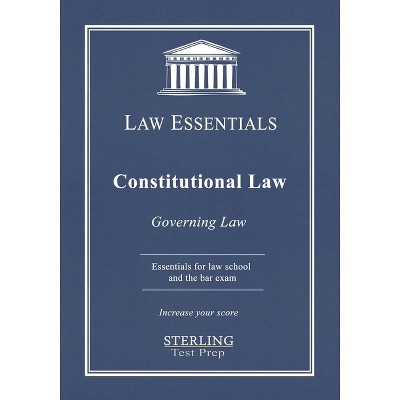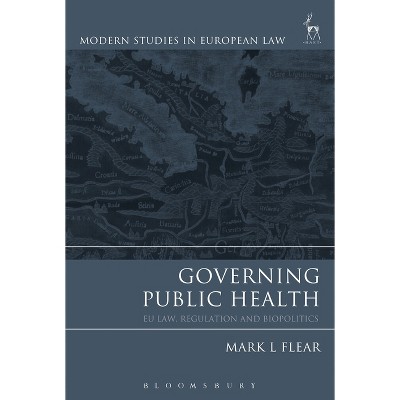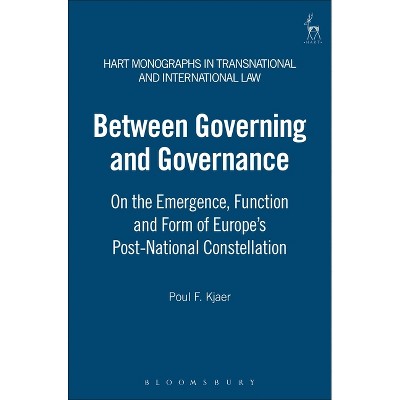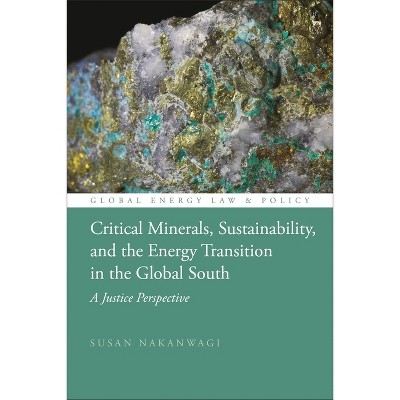Sponsored

Governing the End - (Chicago Law and Society) by Lisa Vanhala
In Stock
Sponsored
About this item
Highlights
- A searing account of how the international community is trying--and failing--to address the worst effects of climate change and the differential burdens borne by rich and poor countries.
- About the Author: Lisa Vanhala is professor of political science at University College London.
- 248 Pages
- Freedom + Security / Law Enforcement, Environmental
- Series Name: Chicago Law and Society
Description
About the Book
"Climate change is increasingly accepted as a global emergency creating irrevocable losses for the planet. Still, different countries experience these losses differently. Reaching even inadequate political agreements is fraught with contestation. Governing the End untangles the complex relationship between deteriorating environmental conditions, high politics and the everyday practices of diplomacy, focusing on the United Nations' agreement to address "loss and damage" and subsequent battles over implementation. Vanhala looks at the different assumptions and strategic framings that poor and rich countries bring to bear and asks why some norms emerge and diffuse while others fail to do so. The book is based on ethnographic observation of five years of UN meetings and negotiations, as well as more than 150 interviews with diplomats, policymakers, UN secretariat staff, experts and activists. It explores explicit political contestation, as well as the more clandestine politics that have stymied implementation and substantially reduced the scope of compensation to poor countries. In doing so, it elucidates the successes and failures of international climate governance. Vanhala shows that it matters materially how ideas are constructed and then institutionally instantiated"--Book Synopsis
A searing account of how the international community is trying--and failing--to address the worst effects of climate change and the differential burdens borne by rich and poor countries.
Climate change is increasingly accepted as a global emergency creating irrevocable losses for the planet. Yet, each country experiences these losses differently, and reaching even inadequate political agreements is fraught with contestation. Governing the End untangles the complex relationship between deteriorating environmental conditions, high politics, and everyday diplomatic practices, focusing on the United Nations' agreement to address "loss and damage" and subsequent battles over implementation.
Lisa Vanhala looks at the differing assumptions and strategic framings that poor and rich countries bring to bear and asks why some norms emerge and diffuse while others fail to do so. Governing the End is based on ethnographic observation of eight years of UN meetings and negotiations and more than one hundred and fifty interviews with diplomats, policymakers, UN secretariat staff, experts, and activists. It explores explicit political contestation, as well as the more clandestine politics that have stymied implementation and substantially reduced the scope of compensation to poor countries. In doing so, Governing the End elucidates the successes and failures of international climate governance, revealing the importance of how ideas are constructed and then institutionally embodied.
Review Quotes
"A landmark contribution to one of the most urgent questions of global justice: how to compensate those the least responsible for and yet most affected by climate change. Grounded in rigorous research, Governing the End offers an incisive account of international law's failures to address this pressing issue. It should be required reading for scholars, policymakers, advocates, and all those committed to understanding and advancing climate justice."--César Rodríguez-Garavito author of "Climate Change on Trial: Mobilizing Human Rights Litigation to Accelerate Climate Action"
"Vanhala provides a much needed and insightful account of the history, politics, and governance of loss and damage in the climate regime. She reveals how the constructive ambiguity of the concept sowed the seeds for future challenges--glossing over critical issues of responsibility and accountability. Ultimately, Vanhala argues, these problems have contributed to the end of governing--where policymakers have created minimal rules which fall short of addressing the underlying challenges we all now face."--Jessica F. Green University of Toronto
"Compelling, illuminating, and provocative, Governing the End is a major scholarly achievement that offers an expansive yet detailed and accessible analysis of the international politics addressing (or evading, as often is the case) the challenges of climate change."--Michael McCann author of "Union by Law: Filipino American Labor Activists, Rights Radicalism, and Racial Capitalism"
About the Author
Lisa Vanhala is professor of political science at University College London. She is the author of Making Disability Rights a Reality?: Disability Rights Activists and Legal Mobilization and coeditor of Governing Climate Change Loss and Damage: The National Turn.










